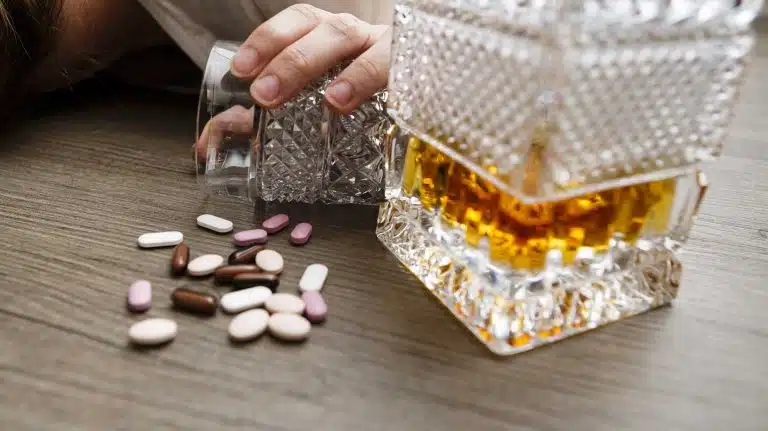Mixing Sleeping Pills & Alcohol | Effects & Dangers
- Side Effects Of Mixing Sleeping Pills & Alcohol
- Alcohol Consumption & Sleep Quality
- Common Sleep Medications
- FAQ

A variety of different over-the-counter and prescription sleep aid medications are used to help those experiencing sleep disorders and difficulties.
However, regardless of the type of sleep medicine you may be using, you should never mix sleeping pills with alcohol.
Drinking alcohol while taking sleeping pills will likely reduce the effectiveness of your medicine, trigger unwanted side effects, and potentially cause a fatal drug interaction or overdose.
Side Effects Of Mixing Sleeping Pills & Alcohol
Ethanol, or drinking alcohol, is a central nervous system depressant, though it does have some initial stimulant effects when consumed in high quantities.
Sleep aids, while they may have varying pharmacology, are also CNS depressants. They have sedative effects that cause drowsiness and promote falling asleep and staying asleep longer.
This makes them an effective treatment for a number of different long or short-lived sleep disorders and sleep problems.
Enhanced Effects Of Sedation
When mixed, alcohol and most sleeping pills have a multiplicative effect, with each substance increasing sedation in combination more than they each would alone.
This greatly increases the risk of dangerous CNS depression, a form of drug overdose, and can cause unwanted short-term side effects that may include:
- dizziness
- confusion
- difficulty concentrating
- impaired thinking, judgement, and impulse control
- impaired physical coordination and reaction times
- sleepiness or drowsiness
- somnambulism (sleep-walking, sleep-driving, sleep-eating, etc.)
- respiratory depression, or difficulty breathing
- slow heart rate
- sleep apnea, a disorder in which breathing repeatedly stops and starts
Drinking alcohol while taking sleeping pills could be a sign of alcohol addiction or sleeping pill addiction, and is considered a form of substance abuse.
Effects Of Alcohol Consumption On Sleep Quality
Alcohol has a negative effect on the quality of sleep you receive after you fall asleep, as well as your overall length of sleep. And, these effects get much worse when you drink in excess.
Alcohol & REM Sleep
Alcohol, while active in your body, suppresses REM (rapid eye movement) sleep, the stage of sleep you go through when you have dreams. This decreases overall sleep quality and can lead to more sleep interruptions and a worse overall sense of restfulness when you wake up.
Extra Glutamate
When you drink a large amount of alcohol your body works to reverse the CNS depression it causes by releasing more of a hormone called glutamate, which is used to create a sense of wakefulness.
Once the alcohol wears off (either before or after you head to bed), this extra glutamate is still around to keep you awake or wake you back up bright and early, hangover or no hangover.
Damaged Sleep Quality
Long-term, alcohol abuse can also damage sleep quality by contributing to:
- sleep apnea
- anxiety
- depression
- obesity
- high blood pressure
- memory problems
- poorer overall health and quality of life
The Most Common Sleep Medications & How They Work
If you’re having trouble sleeping, your healthcare provider may prescribe or recommend one of the following, depending on your situation and needs.
Tricyclic Antidepressants
Trazodone and other antidepressant drugs with sedative effects can be useful in treating anxiety and sleeplessness. They primarily work by increasing serotonin and norepinephrine activity in the brain, boosting a person’s mood.
Benzodiazepines
Diazepam (Valium), temazepam (Restoril), triazolam (Halcion), lorazepam (Ativan), and others are sometimes used to treat serious sleeping disorders including sleepwalking and night terrors. They work by binding to GABA receptors in the brain, slowing CNS activity.
However, benzos can be abused in higher doses and severe physical dependence will likely develop with long-term use. They are also quite dangerous to mix with alcohol.
Z-Drugs
Zolpidem (Ambien), eszopiclone (Lunesta), and zaleplon (Sonata) work similarly to benzodiazepines, though they are considered a safer choice when used to treat insomnia.
Like benzos drugs, they may also cause side effects and dependence, especially when combined with alcohol.
Melatonin
Melatonin is a hormone used by the body to regulate your internal clock. Over the counter Melatonin supplements are sometimes used to help people feel like falling asleep on a better schedule, or for other sleep disorders.
Antihistamines
Diphenhydramine (Benadryl, Aleve PM) and Doxylamine succinate (Unisom) work by blocking the effects of histamine in the body, which influences the wake/sleep cycle.
While available over the counter, antihistamine sleep aids are less effective than other sleeping medications and may cause a variety of minor side effects when used with alcohol.
For information on our addiction treatment options, please contact us today.
FAQ
Is It Safe To Drink Alcohol On Ambien?
No, it is not safe to drink alcohol while on Ambien. This combination can lead to overdose, increased effects of sedation, sleepwalking, and other risky activities.
Learn more about Mixing Alcohol & Ambien
Written by Ark Behavioral Health Editorial Team
©2024 Ark National Holdings, LLC. | All Rights Reserved.
This page does not provide medical advice.
Food and Drug Administration (FDA) - Ambien Label
Food and Drug Administration (FDA) - VALIUM (DIAZEPAM) Label
Mayo Clinic - Prescription sleeping pills: What's right for you?
National Institute on Drug Abuse (NIDA) - Connections between Sleep and Substance Use Disorders
Substance Abuse - Disturbed Sleep and Its Relationship to Alcohol Use

Questions About Treatment?
Ark Behavioral Health offers 100% confidential substance abuse assessment and treatment placement tailored to your individual needs. Achieve long-term recovery.
100% confidential. We respect your privacy.
Prefer Texting?
Our friendly support team is here to chat 24/7. Opt out any time.







 Learn More
Learn More








